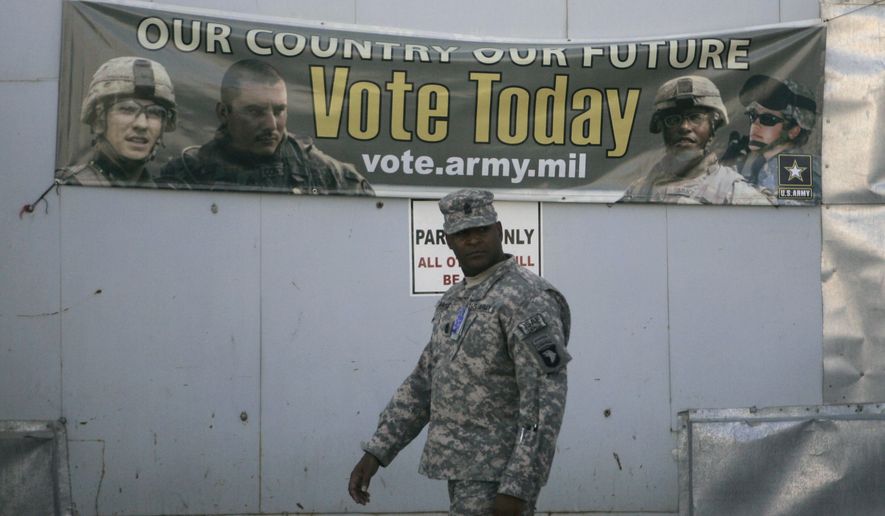After years of accusing states of voter suppression, the Center for American Progress, citing election security, wants to make voting tougher for Americans serving overseas in the military.
The left-wing public policy group issued a report Monday, “Election Security in All 50 States,” that called for stricter standards to prevent cybermeddling in elections by foreign governments, including banning military stationed abroad from submitting ballots via email or fax.
One state that allows such vote casting is Colorado. The center called on the state to “prohibit voters stationed or living overseas from returning voted ballots electronically.”
“Regardless of the state’s secure ballot return system for electronically voted ballots, we recommend that all voted ballots be returned by mail or delivered in person,” said the 245-page report.
Colorado Secretary of State Wayne Williams defended the practice, saying the state has incorporated safeguards to protect the integrity of ballots cast by military personnel living overseas.
“They don’t believe someone who works on a submarine should be allowed to vote. We do,” the Republican said in a statement.
Conservatives were quick to blast the report’s recommendation as unworkable and politically motivated.
“Perhaps they think that Navy SEALs can swim ballots ashore, hand them off to Army paratroopers who can parachute into Colorado to drop off the ballots?” asked the conservative website Colorado Peak Politics.
“You can bet that if the military historically voted Democrat instead of Republican, the Center for American Progress would not have a problem with it,” Peak said in a Monday post.
The report is something of a departure for the center, given its record of fighting for greater ballot access, including pushing for same-day registration, encouraging states to make it easier for felons to vote and lobbying against tighter rules aimed at combating voter fraud.
Founded by former Clinton and Obama White House adviser John Podesta, who sits on its board, the center has opposed state efforts to scale back early voting periods, remove inactive voters from rolls and require government-issued photo identification to cast ballots.
J. Christian Adams, head of the conservative Public Interest Legal Foundation, said the latest recommendation “shouldn’t be a surprise,” given that members of the military tend to lean right.
“CAP would oppose that because they don’t like that the military votes against their interests nearly all of the time,” Mr. Adams said in an email. “But there are very few votes that come in that way, so it’s not a really big issue. CAP wants to make it easier for felons and criminals to vote, but wants to make it harder for fighting men and women overseas.”
The center graded the 50 states and the District of Columbia on an A to F scale based on their cybersecurity standards, paper-trail backups, postelection audits, ballot accounting and other procedures aimed at guarding against election manipulation by other countries.
No state received an A, and five received grades of F, prompting the center to conclude that “election infrastructure in most states remain susceptible to attacks by sophisticated enemies.”
“This report should spur demand across the country for urgent steps needed to defend America’s election security against another attempt by a foreign nation to disrupt our elections,” lead author Danielle Root said in a statement. “While vulnerabilities in the election infrastructure still exist, it’s encouraging to see some states taking steps to better protect their elections.”
Colorado, which received a grade of B, “ranks second in the nation in the number of ballots transmitted to overseas voters based on its voting eligible population,” according to the Secretary of State’s office.
“We’re pleased that we received a high grade,” Mr. Williams said. “We’re known as leaders in election security.”
Colorado wasn’t the only jurisdiction to allow electronically returned ballots. Others dinged for permitting voting via fax or email for overseas military personnel included Alabama, California, Delaware and the District of Columbia.
“The District should prohibit voters stationed or living overseas from returning voted ballots electronically,” said the report. “Going forward, all voted ballots should be returned by mail or delivered in person.”
States like Arkansas that require paper ballots earned plaudits. “The fact that the state prohibits voters stationed or living overseas from returning voted ballots electronically is also commendable,” said the center.
The report named the use of paperless electronic voting machines as the “biggest threat to election security,” given that they leave no reliable paper trail. Fourteen states use such machines in some jurisdictions, and five states rely on them exclusively.
The center concluded by recommending more federal funding aimed at helping states “protect future elections from interference by hostile nations such as Russia.”
“In this threat environment, Congress needs to step up and provide more resources to invest in America’s election infrastructure so that states can do the job right,” said Liz Kennedy, the Center for American Progress’ senior director of democracy and government reform.
• Valerie Richardson can be reached at vrichardson@washingtontimes.com.




Please read our comment policy before commenting.